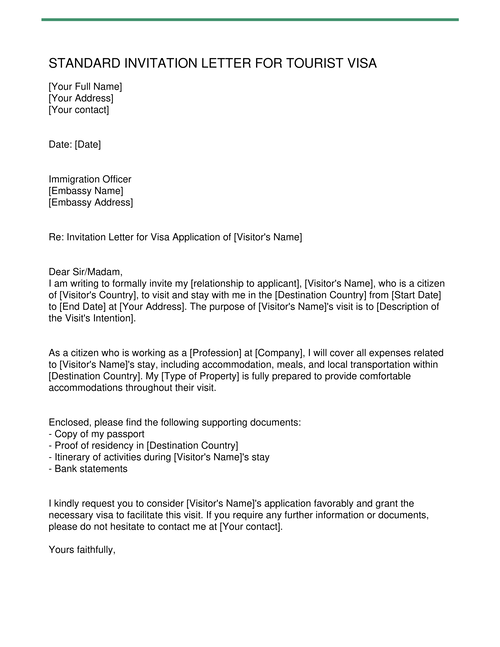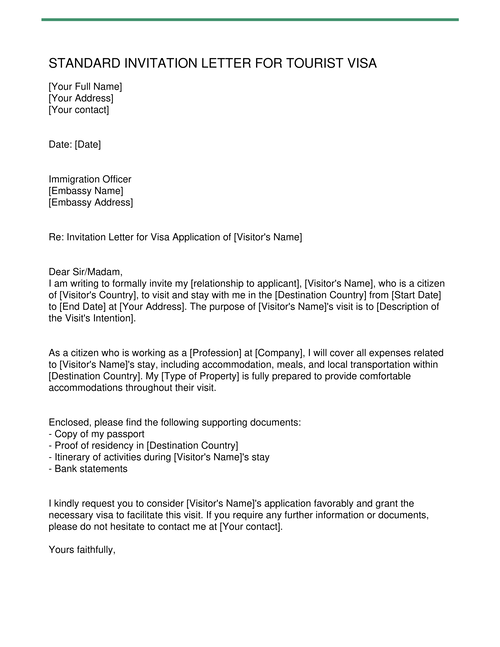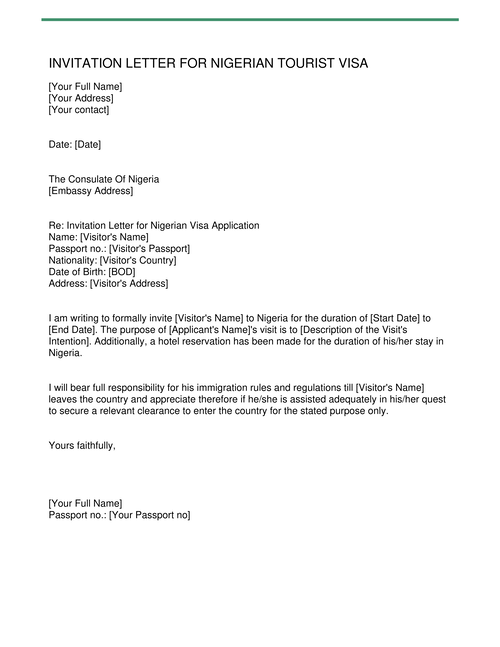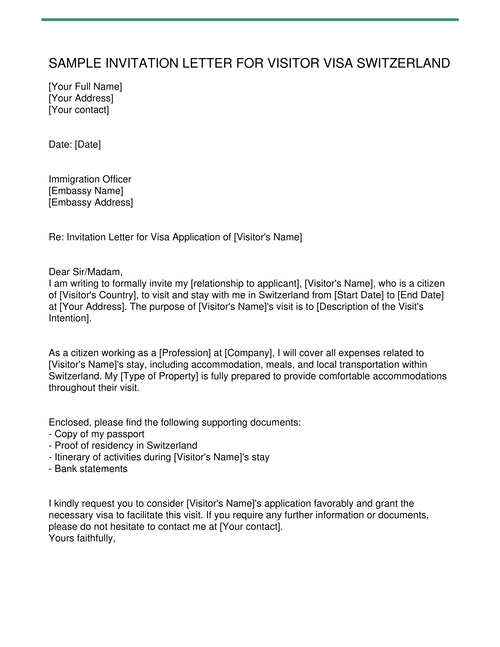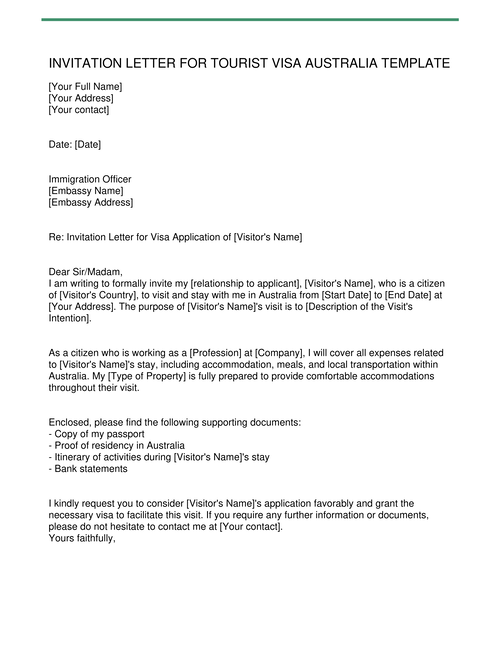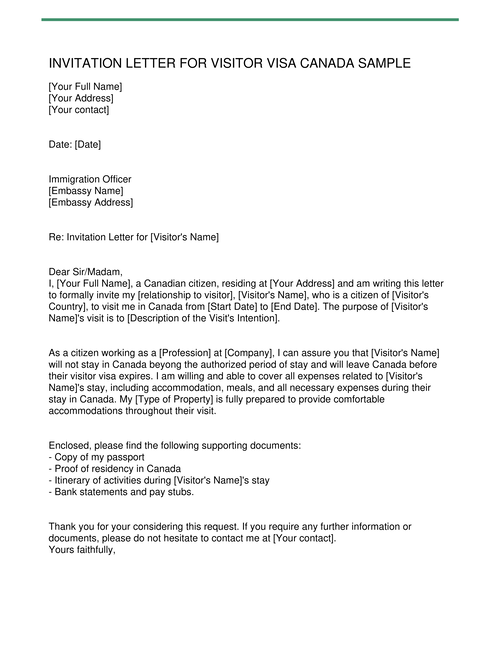Understanding Visa Invitation Letter Requirements
Navigating the world of visa applications can feel like decoding a secret language. Each country will have different regulation and laws to follow. If you're inviting someone to visit, you'll need to draft an invitation letter for tourist visa that demostrate your relationship and capacity to host your invitees in format format. How to do so? Here’s a light-hearted guide to ensure your invitation letter is spot-on and increases the chances of a successful application.
Essential Elements for a Solid Invitation Letter for Tourist Visa
When it comes to invitation letter for tourist visa, there are a few key elements you should be aware of. First, you’ll need to provide your full name and contact details. Make sure to include your current address, phone number, and email. This helps the visa authorities to reach out if they need more information.
Next, your letter should clearly state the purpose of the visit. Is your guest coming for a holiday, family reunion, or perhaps a special event? Clearly outlining the purpose ensures the authorities understand understand the reason for the visit and makes it easier for them to process the application. For example, if your cousin is coming for a wedding, mention the wedding date and your relationship to the guest, such as "I am inviting my cousin, John Smith, to attend my wedding on September 15, 2024.
The letter should also include detailed information about your guest. This means listing their full name, passport number, and date of birth. Providing this information ensures there is no confusion about the identity of your visitor. Therefore, even though you included these details in your letter, you should attach copies of documents to prove the information is correct. For example, include passports of both you and your guest for identification.
Proving Your Relationship and Financial Support
To add credibility to your invitation letter for a tourist visa, you’ll need to demonstrate your relationship with the guest. This can be done by describing how you know each other such as your counsin/uncle. However, if you’re inviting a friend, it will be slightly different from inviting a family member. You will need to explain in more detail how long you’ve been friends and any shared experiences. You can write something like, "Duy Hung Nguyen is my close friend, whom I have known for five years since we were classmates in an exchange program at the International Business School in Vietnam. I would be happy to have him attend my wedding on September 15, 2024"
Additionally, it’s crucial to show that you can financially support your guest during their stay. This involves stating that you’ll be responsible for their accommodation and daily expenses. Such as "I am willing and able to cover all expenses related to Duy Hung Nguyen’s stay, including accommodation, meals, and all necessary expenses during their stay in Canada."
Including Specific Dates and Accommodation Details
One key element that should not be overlooked is providing specific dates for the visit. Mention the exact arrival and departure dates to give the authorities a clear idea of the intended stay duration. This helps in assessing whether the visit aligns with the visa’s validity period.
Accommodation details are another important aspect to include. Specify where your guest will be staying. If they’ll be staying with you, mention your address and the length of their stay. If they will stay in a hotel, provide the name, address, and booking details of the hotel. This information reassures the visa authorities that your guest has a proper place to stay during their visit.
Related Templates
But if you change your mind and want to include more specific sponsor conditions—such as covering expenses for accommodation, travel, or other costs—a sponsorship letter may be a better option. A well-written sponsorship letter can help strengthen your guest’s visa application by demonstrating your financial commitment and support. Check out our 🔗sponsorship letter templates for tourist visa, customize them as needed, and formally invite your friends and family to come visit you.
Top Mistakes to Avoid in an Invitation Letter for Tourist Visa
Writing an invitation letter for tourist visa can be a bit tricky, and it's easy to make mistakes and time consuming. You definitely don’t want something small to trip up your guest’s visa application. Here’s a fun guide to help you avoid common errors in your invitation letter. With these tips, plus using our Invitation Letter for Tourist Visa template, you’ll be on your way to crafting a letter that ticks all the boxes!
1. Incorrect or Incomplete Information
One of the most frequent mistakes in invitation letter for tourist visa is providing incorrect or incomplete information. It’s crucial to double-check every detail you include. For example, make sure you write the full and correct names of both you and your guest. Missing or wrong information, like an incorrect passport number or spelling errors, can lead to delays or even denials.
If you’re unsure about any detail, it’s worth confirming it with your guest before finalizing the letter. A little extra time spent verifying information can save you from unnecessary headaches later. Always remember that accuracy is key when dealing with official documents.
2. Skipping Proof of Financial Support
Visa authorities want to know that your guest won’t be a financial burden during their stay. Skipping the proof of financial support is a big mistake. You need to clearly state that you will cover your guest’s accommodation and expenses, and it’s helpful to attach supporting documents.
Include details like your 🔗bank statements, pay stubs or a 🔗letter from your employer showing your financial stability. This demonstrates that you’re prepared to support your guest, making their visa application more credible. Without this proof, the authorities might question your ability to host your guest properly, which could cause a delay in the visa application process.
3. Neglecting to Include Specific Dates and Accommodation Details
A common error is neglecting to include specific dates and accommodation details. It’s important to provide the exact dates of your guest’s visit and their accommodation arrangements. Whether they’re staying with you or at a hotel, include this information clearly in the letter.
For instance, write, "My cousin will arrive on September 10, 2024, and will stay with me at my home until September 20, 2024." This level of detail helps visa officers understand the duration and logistics of your guest’s stay, reducing the chances of misunderstandings or delays.
Important
Additionally, the information you provide must match your guest's information. Any discrepancies can result in the visa application being denied. For this reason, you and your guest need to ensure the timelines and itinerary details are consistent. Using our invitation letter for tourist visa template will make sure your letter covers all needed details.
4. Using a Too-Informal Tone
While it’s great to be friendly, using a too-informal tone can be a mistake. Your invitation letter should be professional yet warm. Avoid using slang or overly casual language. Instead, stick to a polite and formal tone that conveys respect and seriousness.
For example, rather than writing "I want my cousin come to see me and explore our city together." try "'I am writing to formally invite my uncle to visit me for tourism purposes. I would love to show him around Toronto, the city where I live, and explore iconic landmarks such as the CN Tower, the Royal Ontario Museum, and other notable places." This approach maintains the formality needed for a visa application while still being welcoming.
5. Omitting Your Signature and Date
Not signing or dating your letter might seem like a minor oversight, but it’s an important detail. Your signature and the date provide authenticity to your letter. It confirms that you are genuinely inviting your guest and adds a personal touch.
Make sure to end your letter with a hand writing signature and the date you wrote it. This small step reinforces the validity of your invitation and ensures that the letter meets all formal requirements.
6. Forgetting to Proofread
Last but not least, forgetting to proofread your letter is a mistake you should definitely avoid. Spelling mistakes, grammatical errors, or typos can detract from the professionalism of your letter, especially when you use an example of invitation letter for tourist visa to copy-paste and craft your letter manually. It can lead to unexpected error during editting it. It’s always a good idea to read through your letter several times before sending it.
If possible, have someone else review it too. Fresh eyes can catch errors you might have missed and provide feedback on clarity. A well-proofread letter is more likely to make a positive impression and help with a smooth visa application process.
Why Choose Editable Invitation Letter for Tourist Visa Templates Over Samples?
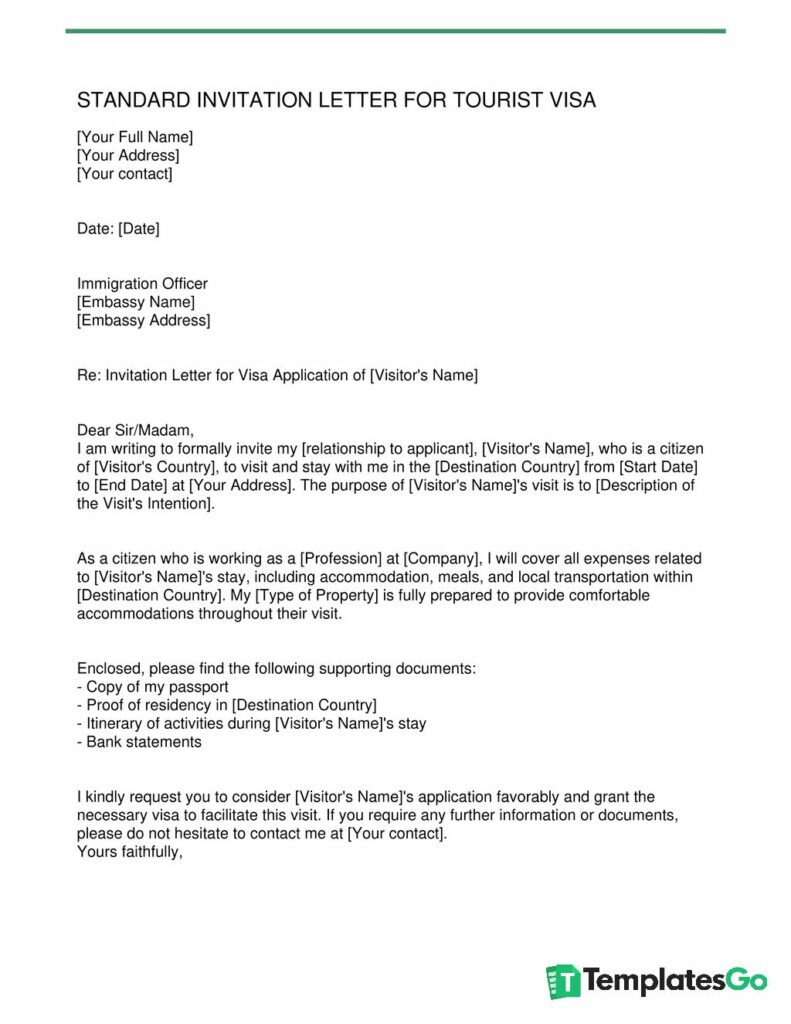
As mentioned at the beginning, here’s why you should choose a template over a sample. While samples can provide a general idea, they often lack the flexibility you need. Editable invitation letter for tourist visa template, on the other hand, allows you to easily customize every detail to fit your specific situation.
Using an invitation letter sample for a tourist visa can be a bit like wearing someone else’s shoes—sure, they might fit, but they might not be perfect. For example: you found a sample invitation letter for visitor visa switzerland but you are making an invitation letter for other country, then you have to rewrite entirely and manually editing the sample to adapt your intent.
On the other hand, editable offers a more tailored solution. They come with pre-set sections that ensure you include all the necessary information while giving you the freedom to make adjustments. This makes your letter more accurate and personal, which can make a big difference in the visa application process.
Another advantage of editable Standard Invitation Letter for Tourist Visa template is their convenience. Instead of copying a sample and then trying to tweak it, you can fill out a template directly. This saves time and reduces the risk of missing crucial details. Plus, templates often have built-in guidelines and prompts that make the writing process smoother. From doing research and crafting this letter manually, you now can create it within 5 minutes professionally.
Related Template
We have one article talking specifically about 🔗Invitation Letter for US Visa where you will find comprehensive information and our editable templates to customize your letter with few simple steps.
Invitation Letter for Tourist Visa Templates
Editable templates are incredibly efficient. Instead of drafting your letter from scratch, you can start with a pre-designed format that includes all the essential elements. This means you won’t need to worry about missing crucial details or forgetting any required information. Just follow 3 simple steps and and you’re good to go!
- Pick an invitation letter for tourist visa template from the list below.
- FIll your details by answering simple questions.
- Review and download your letter in PDF.
That’s it! Now it’s your turn to create your invitation letter for your beloved guest and enjoy the experience with us.
Q&A
1. Do we need an invitation letter for Canada Visa?
According to the 🔗Government of Canada: "Sometimes, when you apply for a visa to visit Canada, we ask you to give us a letter of invitation from someone in Canada. A letter of invitation doesn’t guarantee that we’ll issue a visa. Visa officers assess you to decide whether you meet the terms of Canada’s immigration law." You can find our invitation letter for tourist visa template to Canada at the end of this article. Simply download and customize it quickly to suit your needs.
2. To go to China do I need an invitation letter?
According to 🔗cs.mfa.gov.cn, you can use an invitation letter as a supporting document for C-Visa, F-Visa, L-Visa, M-Visa, Q1-Visa, Q2-Visa, S1-Visa, S2-Visa and Z-Visa (for this type of visa, the invitation letter also called Invitation Letter of Duly Authorized Entity or Confirmation Letter of Invitation issued by relevant Chinese entities.). You can download Invitation Letter for China Visa from the 🔗goverment website here.
3. Do we need an invitation letter to visit family in Spain?
Yes, you do need an invitation letter to proof where will you stay in Spain. However, your family must go to police station where they live in Spain to request an official invitation letter. You will need proof of finance, a census record (known as empadronamiento), renting contract or proof of ownership of a property.

